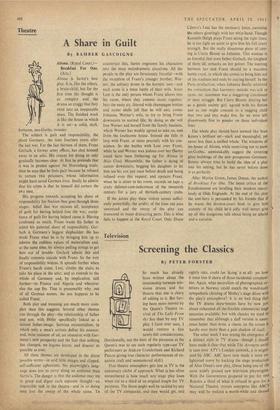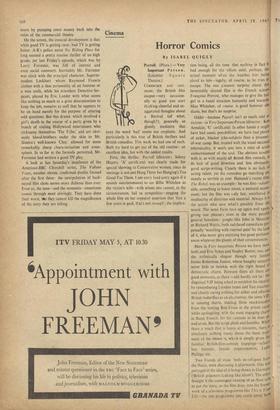Television
Screening the Classics By PETER FORSTER $o much has already been written about the relationship between tele- vision drama and the theatre that one is chary of adding to it. But hav- ing been more moved by the Queen's Theatre re- vival of The Lady From tlic Sea than by any TV play I have ever seen, I would venture a few newly-felt considerations.
(Incidentally, not the least of the pleasures at the Queen's was to see such regularly type-cast TV performers as Andrew Cruickshank and Richard Pascoe giving true character performances of ex- quisite craft and unmannered skill.) That theatre atmosphere gets lost in TV is the customary cliche of approach. What is less often remembered is how much any stage play loses when cut to a third of its orisinal length for TV purposes. The Ibsen might well be tackled by any of the TV companies, and they would get, and rightly take, credit for 'doing' it at all: yet how it must lose if shorn of those incidental complexi- ties. Again, what naturalism of photographed ex- teriors in Norway could match the wondrously sympathetic chiming of Motley's stage decor with the play's atmosphere? It is no bad thing that the TV drama dera-tments have by now just about exhausted all the feasible commercial stage successes available; but with classics we need to remember that although a duff version is some- times better than mile, a classic on the screen IS hardly ever snore than a pale shadow of itself. The other week I was noting the emergence of a distinct style in TV drama—though I should have made it clear that while The Avengers serial is seen over ATV's London network, it is origin- ated by ABC. ABC have now made a most en- lightened move by backing the stage production of Alun Owen's new play, Owen being one of the most widely praised new television playwrights. With the Government prepared to pay for two Renoirs a third of what it refused to give for a National Theatre, private enterprise like ABCs may well be making a worth-while and shrewd move by pumping some money back into the veins of the commercial theatre.
On the screen, the ironical development is that while good TV is getting rarer: bad TV is getting better. A-R's police serial No Hiding Place for long seemed a pretty routine thriller of no high grade, yet last Friday's episode, which was by Larry Forrester, was full of interest and even social comment. Inevitably Mr. Forrester was stuck with the principal character, Superin- tendent Lockhart. wham Raymond Francis clothes with a thin personality of set features or a wan smile, while his attendant Detective-Ser- geant, played by Eric Lander with what seems like nothing so much as a grim determination to keep the job, remains so null that he appears to be on hand merely for the purpose of uttering odd questions. But this drama which involved a girl's death in the course of a party given by a 'bunch of visiting Hollywood entertainers who nickname themselves 'The Tribe,' and are obvi- ously blood-brothers under the skin to Mr. Sinatra's well-known 'Clan,' allowed for some remarkably sharp characterisation and atmo- sphere. In so far as the formula permitted, Mr. Forrester had written a good TV play.
A look at last Saturday's instalment of the American-BBC Churchill series, The Valiant Years, number eleven, confirmed doubts formed after the first three: the interpolation of hack- neyed, film shots seems more dubious than ever. Even so, the man—and the moments—sometimes comes through most stirringly. They have done their worst, bet they cannot kill the magnificence of the story they are telling.















































 Previous page
Previous page